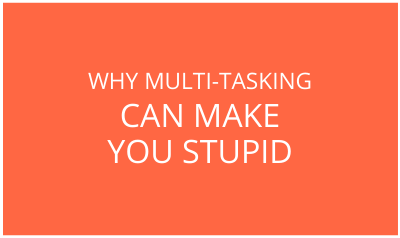Like many ambitious people, you probably take great pride in being a multitasker.
You send an email, talk on your phone, check the market, and take meeting notes all at the same time …or so you think.
As a multitasking expert, you believe the more you react to, the more productive you are.
As the official bubble buster around here, it’s my job to tell you that on the contrary, multitasking makes you lousy at getting anything done efficiently or effectively.
That’s because your brain has limited energy each day.
The more you switch tasks, the more you zap the energy out of it.
Which makes you do things like send an email without the attachment, forget your client’s name, or suffer from general brain fog by early afternoon.
The best analogy I can make to your brain and its counterproductive information overload is to your cell phone.
You charge your phone at night and in the morning it’s fully charged, and the battery is green.
Over the course of the day, you check Facebook, jump onto Amazon, watch a YouTube video, check Instagram, respond to eight texts, take three calls, create a Pinterest board, check the weather, post on Twitter, read a few articles, share a video, and so on and so on.
Then, before you know it, let’s say by 3:00 p.m., your battery is red, you’re almost out of power, and you need to recharge your phone again.
Your brain is the same way.
You wake up in the morning, fully charged and battery full.
Over the course of the day, you incessantly jump back and forth from text, to call, to search, to post, to spreadsheet, to list, to document, to conversation, to email, to plan, to response, to thought, to worry, to article, to video, to news, and so on and so on.
Then, like clockwork, let’s say by 3pm, your brain is fried, your energy is spent, your battery is red, you’re just about out of power and need to recharge again.
Each time you jump to another thought or activity, hello multitasking, and get back to what you were working on just before you got distracted, you invest brainpower in reprocessing information.
What a waste of your reservoir of energy in your battery power!
You chip away at your battery life faster and faster each time you switch thoughts.
Neuroscience research tells us that the brain doesn’t really do tasks simultaneously, as we thought or hoped it might. In fact, we just switch tasks quickly.
Each time we move from hearing music to writing a text to talking to someone, there is a stop/start process that goes on in our brain.
Rather than saving time, that start/stop/start process costs time (even very small microseconds), it’s less efficient, and we make more mistakes.
There is a lag time during which your brain must yank itself from the initial task and get into the new task.
This shift, though it feels instantaneous, takes time. In fact, up to 40 percent more time than single-tasking (focusing on one task at a time) – especially for complex tasks.
Yup, you read that right. You can waste up to 40% of your day by constantly switching between tasks. FORTY. PERCENT!
I don’t know about you, but instead of feeling behind and scattered, I’d rather take those few hours every day to get other important tasks done, leave work early, exercise, spend time with my family, watch Tiger King, or simply do my current work better and without feeling so overwhelmed.
If that sounds good to you, here’s the bottom line.
It’s time to put a halt to multi-tasking.
Contrary to what it might feel like, it is not making you smarter or more productive.
Focus on one task at a time.
You can do this, fearless warrior.
The quieting of your anxiety and the success of your career lies in your ability to make the simple things a habit.
Endless encouragement and love,
Mridu
P.S. This Wednesday I’ll be sharing 5 ways to squash multi-tasking. Please join me on this free 30-minute training here and share the link with your colleagues and friends.
P.P.S. The above is an excerpt from my Amazon bestseller book: Accomplish It: 7 Simple Strategies To Get The Right Things Done And Achieve Your Goals. Grab one today (if you haven’t already!) and learn more about how to feel less stressed and have more joy.

Leave a Reply